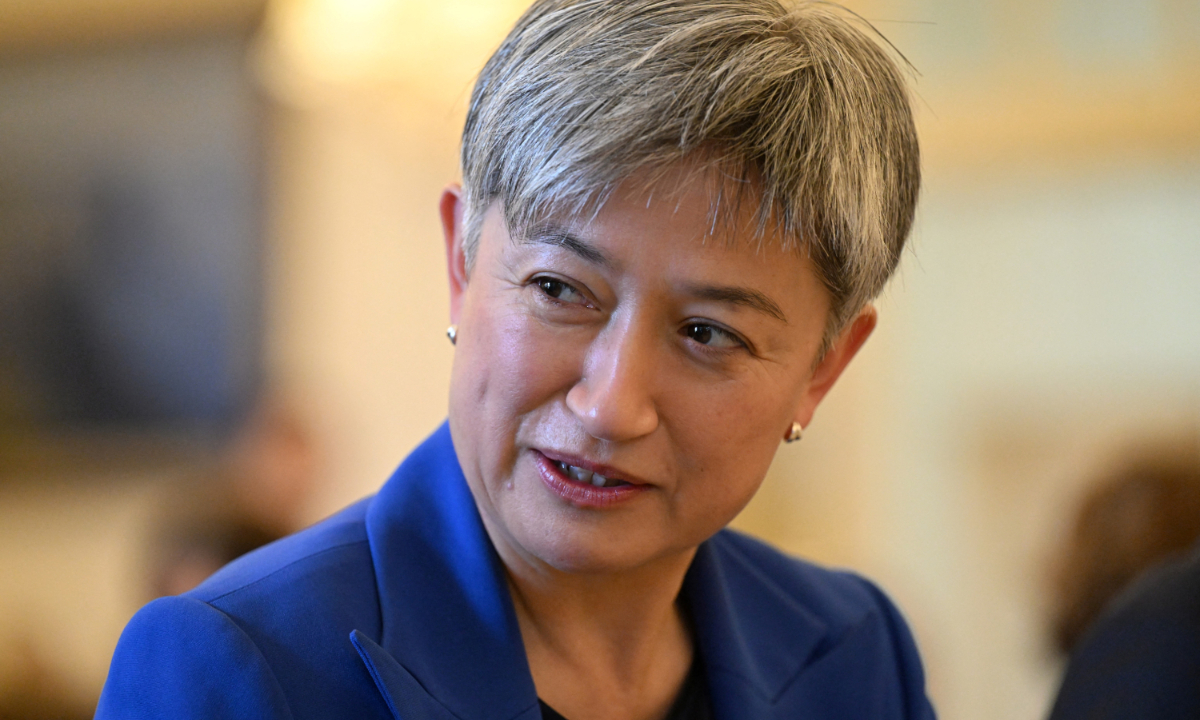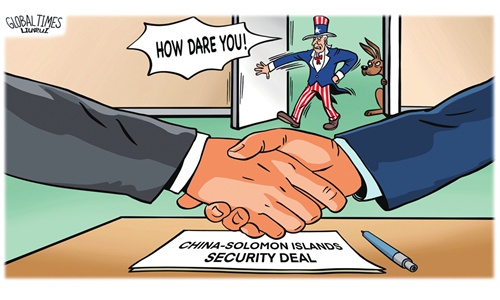Wong’s rhetoric of leaving regional security to Pacific region shows hypocrisy, double standard

Australian foreign minister Penny Wong Photo:AFP
During her first solo trip in Fiji as new Australian foreign minister, Penny Wong outlined Australia's view of security in the Pacific following the signing of a security cooperation framework agreement between China the Solomon Islands, as well as Chinese State Councilor and Foreign Minister Wang Yi's tour of the Pacific island countries.
"We think that it is important that the security of the region be determined by the region," Wong said on Friday. She made a point. The thing is, the audiences of her remarks should be Australia itself and its ally, the US.
According to Wong's logic, regional security should be determined by the region itself, then why has Australia been so enthusiastic in carrying out the freedom of navigation operations with the US in the South China Sea, far away from their own regions? And why have both Australia and the US raised their voices in interfering in China's domestic affairs?
Think about Afghanistan, Iraq, the entire Middle East, South China Sea, the Taiwan question ... Australia has no right to intervene, and it has even less excuse to do so if taking Wong's statement into account, observers note.
Australia is not a Middle Eastern country, so why did it send troops to Iraq and Afghanistan? Australia is apparently not an East Asian country either, but Canberra and Tokyo sighed a Reciprocal Access Agreement (RAA), a bilateral defense and security pact which, according to reports, facilitates faster deployment of Japanese Self-Defense Forces and Australian defense force personnel and eases restrictions on the transportation of weapons and supplies for joint training and disaster relief operations. Why is Australia promoting such military cooperation far away from its own land in East Asia?
What Wong wants to convey is not simply the literal meaning in her rhetoric about the local region, but geopolitical nuances. Wong has been stressing a new construct of a "Pacific family," meaning Australia, New Zealand, and South Pacific island countries are of an exclusive grouping. By saying so, she insinuates two connotations. First, China, which locates in Asia, is not a member of that "family", but should be regarded as an outsider. Australia attempts to drive a wedge between China and regional countries with such insinuation. Second, Australia tries to assume the role as the "head of the family," or in other words, the hegemon in the region, so as to impose its will on other "family members," Chen Hong, director of the Australian Studies Centre at East China Normal University, told Global Times.
Chen added that South Pacific island countries have no such security concerns as what Australia and the US have been hyping up. In fact, their biggest security concern comes from climate change. The rising sea levels is a matter of existential crisis for them. Even though Wong underlined that the new Australian government is determined to make a difference on climate during her trip, it does not change the fact that Canberra has for a so long time casted a cold eye to the issue.
Peter Dutton, former defense minister and likely Liberal leader, even joked about the plight of Pacific Island nations in 2015 as they're facing rising seas due to climate change in a quip "water lapping at your door." When cracking the joke, Australia's contempt toward the regional countries was well disclosed.
This is why South Pacific island countries resolutely seek and welcome cooperation with China, which is in line with their actual needs. The so-called security threat from China, choreographed by Western countries, does not exist at all for the South Pacific islands. The governments and people in Pacific countries have the political wisdom and sensibility to distinguish truths and rumors, according to Chen.
They are well aware that cooperation with China brings real security, which will in turn, apart from cope with climate change, result in social stability and economic development. All of them are the solid benefits regional countries are most in need of.
On the other hand, like Wong's remarks, Canberra's real attitude toward South Pacific islands is not about whether they are "family," but double standards, arrogant colonialism and imperialism, which is vividly presented when Australia points fingers at the countries' mutual beneficial cooperation with China, which is sovereign countries' legal right and is consistent with the spirit of the UN Charter, Yu Lei, chief research fellow at the Research Center for Pacific Island Countries of Liaocheng University, told Global Times. What Wong tries to promote is not the rule - regional security should be determined by the region, but colonial rules, Yu added.
Solomon Islands' foreign policy - friends to all, enemy to none - reflects the mentality of regional countries. They have no interests in taking sides, or making decisions on whom to interact with by ideological differences, like the US and Australia. And colonial mentality won't last long in the international community.
When Australian politicians ever attempts to touch upon "regional security" again, it might as well think about its own behaviors in other regions, and the true nature of its own cooperation with them.

